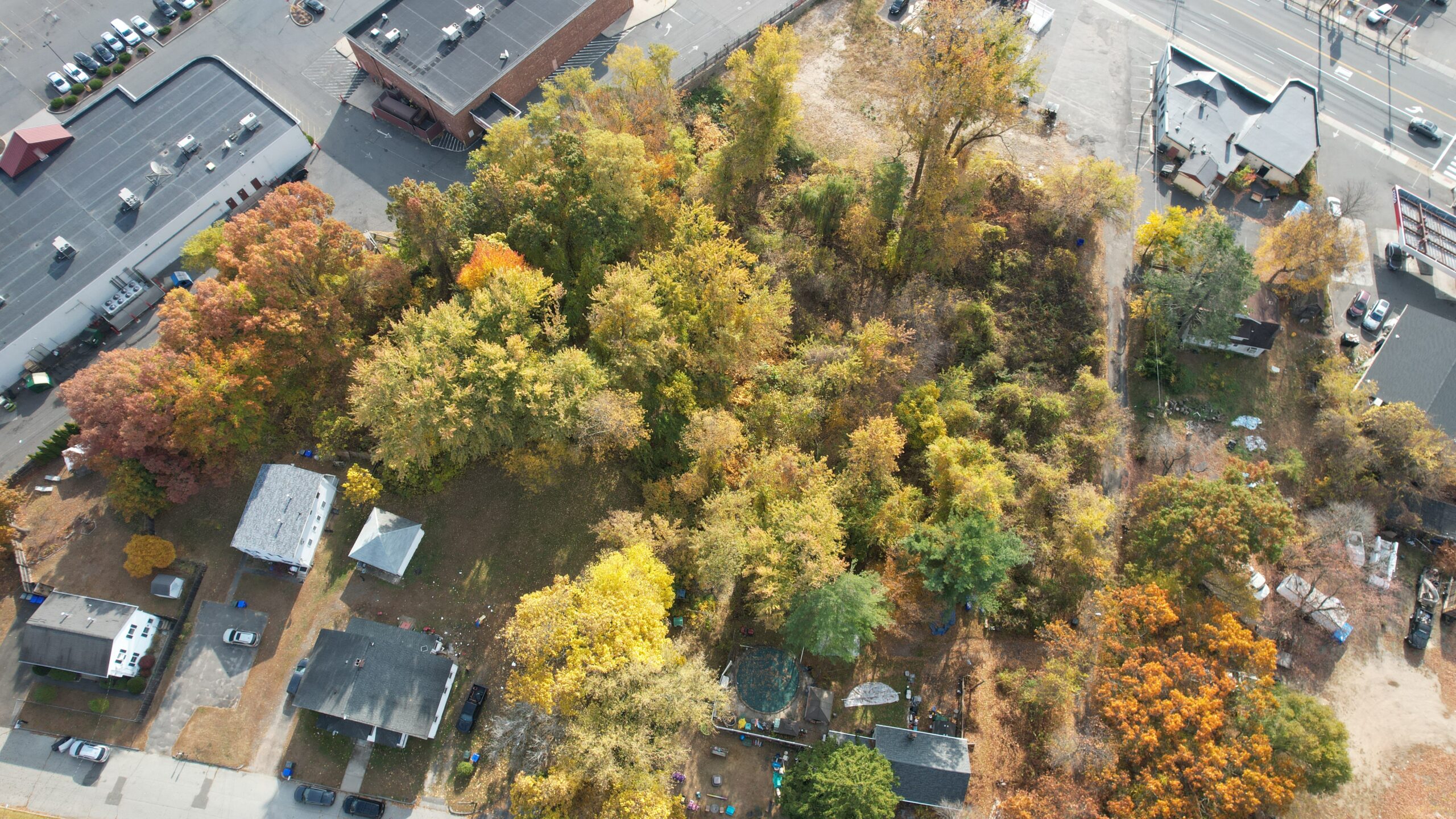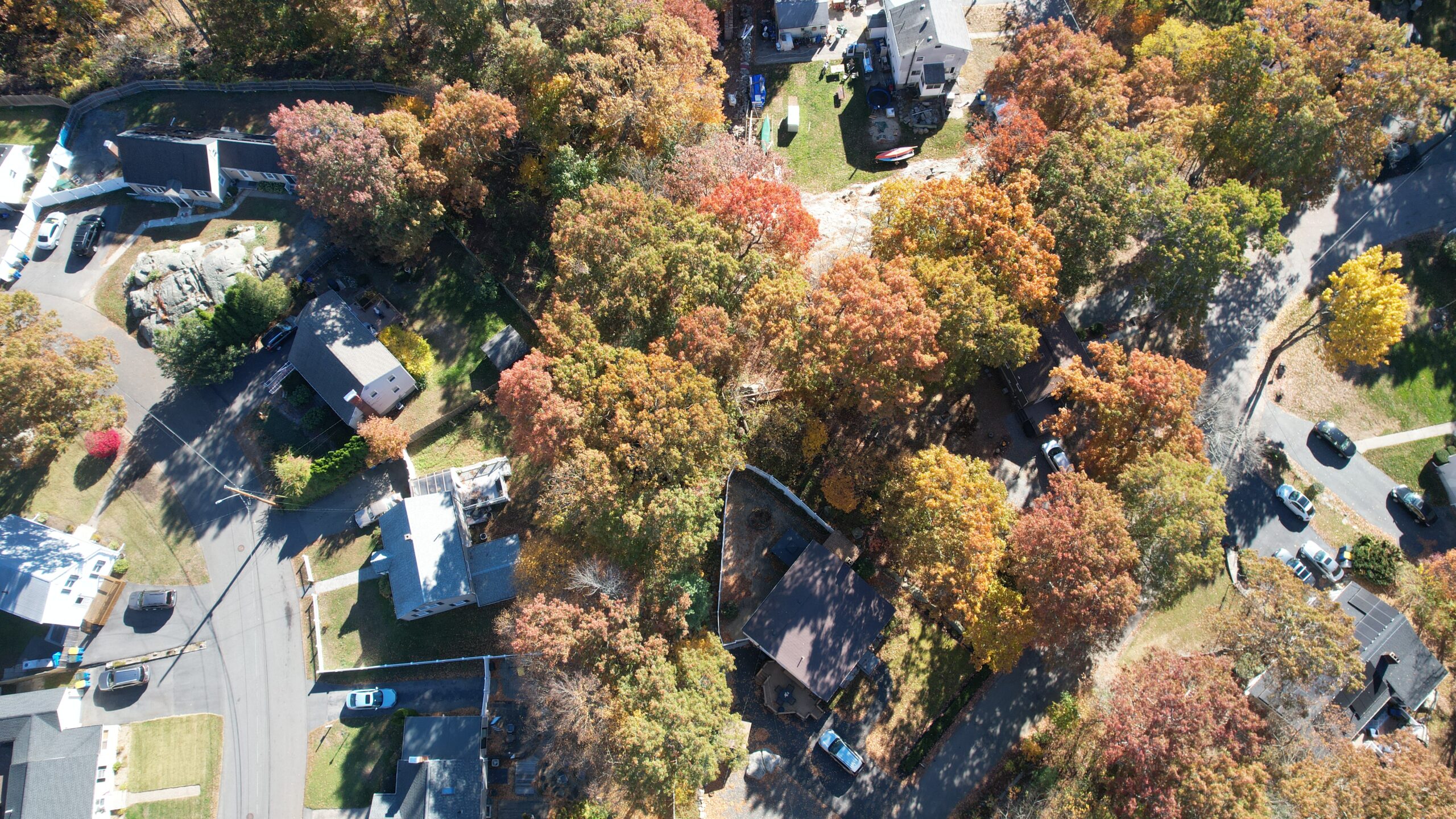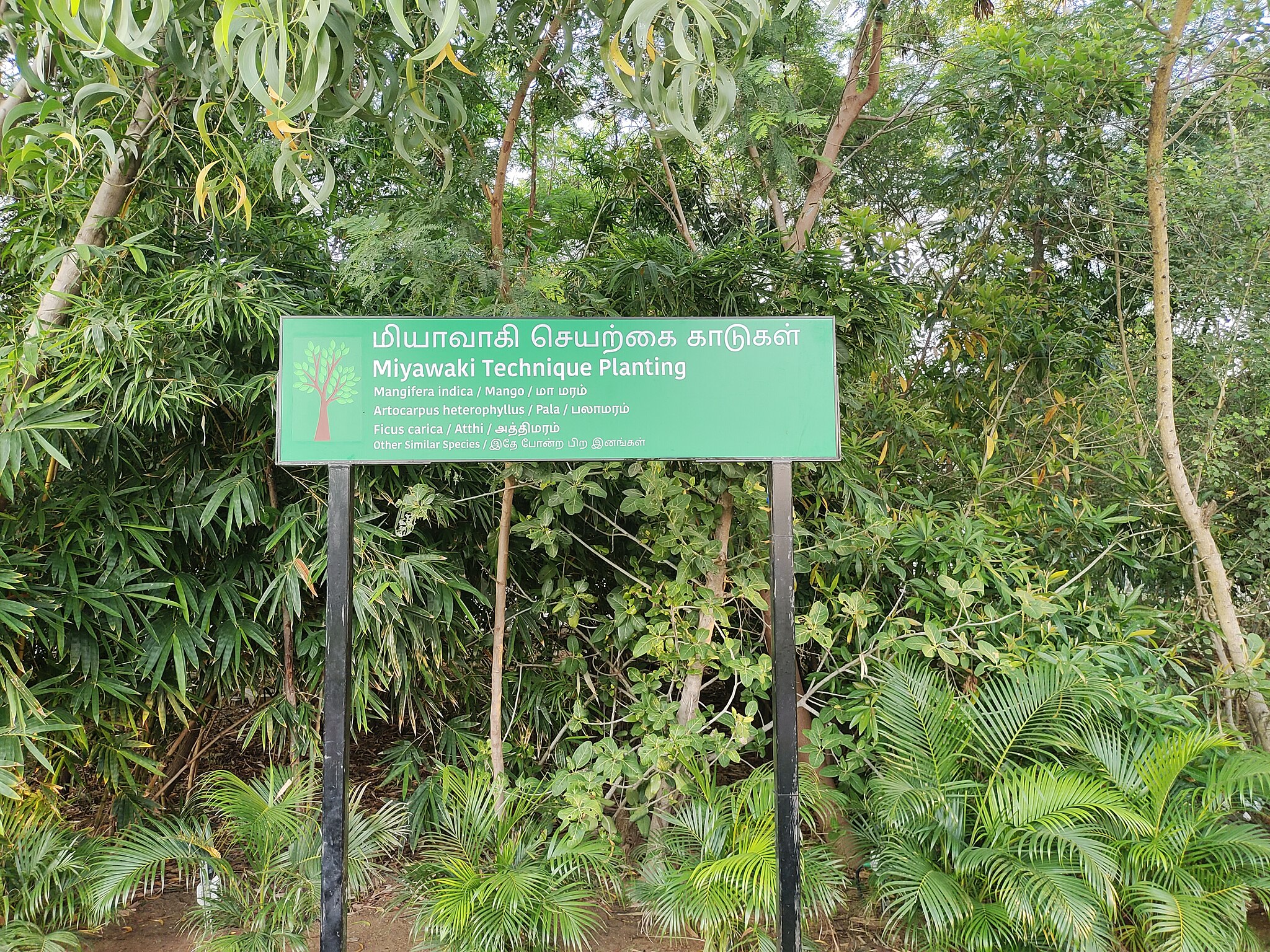Two Urban Forests Planned by MassLandlords on Donated Lands
| . Posted in News - 0 Comments
By Eric Weld, MassLandlords, Inc.
MassLandlords has applied for a grant from the state Department of Conservation and Recreation, with extensive community and member support, to transform two urban, unbuildable land lots into rich, thriving mini-forests.

This wooded wetland in the Indian Orchard section of Springfield, Mass., has been generously pledged for donation by MassLandlords member An Dinh. The parcel is heavily overgrown with a wetland running through its deepest recesses, and sits amid residential neighborhoods and commercial businesses. If we receive a DCR grant, we will work with Bio4Climate to determine which existing trees are native and non-invasive, and what new tree saplings to plant. The resulting Miyawaki forest would be available as a living woodland laboratory for schools in the region. cc by-sa MassLandlords
In winter 2023-24, we reached out to our members to see if anyone might be interested in reducing their tax burden by donating their small, unbuildable, urban lots. Some of our members own corner lots, for example, left over from a development project but too small to build on. Others own lots on steep slopes, protected wetlands or other terrain that deems them unsuitable for building and of little use.
Our intention was to transform these unbuildable lots into dense, thriving forests and wetlands as a way to offset damaging effects from climate change and improve urban environments. It was a win-win, we projected, allowing landowners to offload unusable parcels costing them tax dollars for which they were getting no return, while improving urban communities with much-needed green spaces.
We asked. You delivered.

This small lot in Randolph, Mass., pledged for donation by Don Sanders and the Sudnovsky Family Trust, sits in a residential neighborhood amid several houses. It is overgrown with some trees, bushes and brush, and undergirded by large rock on one side. The size of this lot, 0.14 acres, suits well the needs of a Miyawaki forest. cc by-sa MassLandlords.
We received two land grant pledges in response to our outreach. One site is a 0.14-acre lot in Randolph, Mass., pledged for donation by Don Sanders and the Sudnovsky Family Trust. The lot is a small patch between two residential properties, overgrown with weeds and brush. The other site is nearly three-quarters of an acre in the Indian Orchard section of Springfield, Mass. This lot has been pledged for donation by longtime MassLandlords member An Dinh. The plot is an overgrown wetland in a land depression sitting amid several residential and commercial lots.
We are thankful to Don Sanders’ family and to An Dinh for their generous donations.
Both of these lots are in Environmental Justice (EJ) communities. EJ communities are designated urban areas with relatively higher concentrations of poverty, on varying levels. These communities are typically exposed to poorer environmental conditions, with more pollution, less green space, trees and shade, and worse air quality than more affluent and rural communities. As a result, residents of EJ communities have higher rates of diseases such as asthma, COPD and emphysema. Poorer environmental conditions can also negatively affect academic performance, economy and social vitality.

This photo shows a Miyawaki garden forest in India. As shown, Miyawaki forests feature dense planting of trees to encourage competition for sunlight and fast growth. Cc by-sa 4.0 Jatin071178 wikimedia commons.
Miyawaki Forests
With these two land donations in the works, MassLandlords has applied for a state grant to transform the unbuildable lots into dense, thriving, urban forests and wetlands. The state Department of Conservation and Recreation (DCR) offers an Urban and Community Forests Challenge Grant that awards funds annually to organizations and municipalities proposing projects that will add trees and greenery to Massachusetts cities. Funds for the grant have been designated through the federal Inflation Reduction Act. We applied for the grant on deadline for Nov. 1. Grant awards will be announced sometime in spring 2025.
If we receive the DCR grant, we intend to create fast-growing mini-forests on these parcels using methods developed by Akira Miyawaki (1928-2021). Miyawaki was a Japanese horticulturist who was originally charged with growing fast-developing forests around industrial areas as a way to offset environmental impacts and mitigate storm runoff. His forest-growing innovations have grown internationally and for other purposes, now with more than 200 Miyawaki forests around the globe.
The Miyawaki forest method involves preparing the land by first identifying and removing invasive plants and trees, roots and seeds, and optimizing the soil for new planting. The forests are populated with a list of native, non-invasive tree species, planted as saplings. The species are chosen to be complementary, but planted densely to create competition for sunlight and encourage fast growth. By this method, Miyawaki forests become self-sustaining, requiring no weeding or watering, after only three years. These forests mature within 30 years, a rate ten times faster than the 300 years it takes conventional forests to mature.
Project Partnerships
Two such forests were recently planted in Cambridge by Biodiversity for a Livable Climate (Bio4Climate), a nonprofit organization based in that city that seeks to restore ecosystems to reverse or lessen damaging effects from climate change.
We reached out to Bio4Climate and will partner with them on our urban forest project. Their expertise and experience in planting Miyawaki forests, combined with our donated land parcels, presented a symbiotic partnership opportunity.
In applying for the DCR grant, we also created connections with tree wardens and conservation administrators in the respective communities, who enthusiastically support our projects for the benefits they will deliver for surrounding neighborhoods.
Just as importantly, we began relationships with science teachers in schools near the project sites, who are excited for the teaching opportunities around topics like biodiversity, urban ecology, animal behavior, biogeochemical cycle, impacts of climate change, tree growth and interactions among ecosystem organisms, to name a few. We will also work with teachers to coordinate student volunteers for site preparation, planting, maintenance and forest monitoring throughout and after the projects.
Only the Beginning?
The idea to seek unbuildable urban land parcels for the purpose of creating city forests and green spaces is unique and holds promise for large-scale health, aesthetic and economic improvements for people living in Massachusetts cities. Large cities in general, and EJ communities in particular, absorb more sunlight in comparison with nonurban areas because of the concentration of concrete, large buildings and lack of trees. As a result, urban areas tend to have higher average temperatures than rural counterparts, less healthy air and higher rates of cardiopulmonary maladies. Average living expenses can run higher in these areas because of increased needs for air conditioning and water, while property values are depressed due to the unfavorable environmental conditions.
In our ideal projection, our model for turning small, unusable urban sites into mini-forests will become an ongoing trend with new, fast-growing green spaces sprouting up in cities across the state. The breadth of improvements that can be realized simply by planting trees in cities is documented in numerous studies.
If you own, or know someone who owns such land, let us know by sending a note to hello@masslandlords.net.
Why is MassLandlords Interested in Trees?
We take seriously every aspect of the MassLandlords tagline, “Better Communities. Better Policy. Better Lives.” We work hard and publicly on better rental housing policy. This urban forest project is about supporting and creating better communities and better lives.
At MassLandlords, we have always taken a holistic approach to our mission of creating better rental housing for all. Rental housing is about much more than just a dwelling. Creating better rental housing is about community, family, health, environment and other life factors. To us, it would make little sense to focus on improving rental dwellings without any regard for yards, lots, neighborhoods, communities, the air, earth and water and wider contexts of living and making lives in rental housing.
Planting trees and improving environments around rental housing fit neatly into our mission. These projects help create the conditions for happier tenants. Happy tenants, as we all know, make happy landlords.
The Board of Directors have been fully briefed on this grant project and approved the effort.
As we pursue our urban forest-planting projects, we hope to enlist the interest, support and assistance of more of our members. Let us know your thoughts, and if you’d like to be involved, at hello@masslandlords.net.
Learn how the new Massachusetts Urban Conservancy is reducing property owner expenses and giving back to the community.




